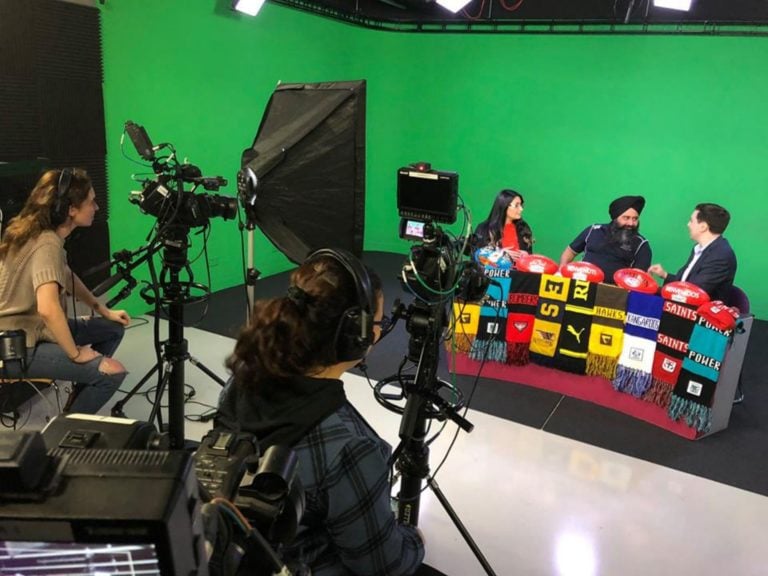Next weekend National Ethnic and Multicultural Broadcasters Council, NEMBC, is bringing together over a hundred and fifty ethnic and multicultural broadcasters at their annual NEMBC conference in Perth.
Russell Anderson, NEMBC’s Executive Officer is excited about the Conference as a “reason for broadcasters to get together, to network.”
Radio is still the most powerful media in the world. Everyone listens to radio, and many spend vast amounts of time, voluntarily, burrowed in a nondescript building at all hours of the day and night, producing tailored radio programs for their listeners.
With the advent of digital radio and social media, ethnic independent radio programs can now reach “thousands of their diaspora not only in their locale, as was once the case, or Australia but their whole diaspora,” says Anderson.
The Syrian program on Melbourne’s 3ZZZ 92.3FM, a tiny Greek program on Queensland’s 4EB 98.1FM, or an arts program, like Tickles with Gigi and Alice on Radio Fremantle 107.9 FM, have the capacity to reach hundreds of thousands globally, consequently undermining the power of traditional media.
Independent community broadcasters, unlike other media workers, are small atolls in a wild and open media ocean.
“Community radio broadcasters can be isolated, so it is important to have them meet each other, to learn and to share from each other develop things,” says Anderson.
NEMBC formed 32 years ago as a “reaction to the community broadcasting peak body,” he explains. “The CBAA Community Broadcasting Association of Australia is there to lobby government, but the ethnic broadcasters did not feel that it was representing its voice as effectively as they wanted.”
As an advent of NEMBC, the disability sector, the Indigenous broadcasters and others now have representative councils.
There is also synergy as Anderson says “we meet regularly as sector bodies.We meet at sector round tables twice a year, and we do projects supporting each other.”
NEMBC is a “voice for ethnic community broadcasting” and the Government allocates $4m every year for radio stations that have ethnic broadcasting, and there is another $1m for training, there is more for digital roll out, according to Anderson there is about $20m for community broadcasting.

Digital broadcasting excites Anderson; “there is digital broadcasting around the coast of Australia with over thirty-seven community radio stations now producing digital broadcasts,” he says.
The digital footprint is handled by CBAA, the larger industry body, and NEMBC is involved in that process.
“Our ethnic stations and the stations that support that program are all on the digital spectrum, sharing space with ABC Radio and SBS,” says Anderson.
The NEMBC conference has real outcomes as the largest gathering of ethnic community broadcasters in Australia.
Anderson is proud of Speak My Language, a project borne out of the NEMBC Conference in 2017. “I met Terri Leoleos from the Ethnic Communities Council of NSW, and we developed this amazing idea of producing aged care information in various languages, which now are programmed across SBS Radio and a stack of commercial and community radio programs,” he says.
Anderson’s hunger for citizens’ media landed him on what was then East Timor, for seven years. There he worked in development work including media training for Timorese citizens.
Our leaders, Labor and the Coalition, avoided confrontation with Indonesia over appalling human rights violations in Timor; we ignored the murder of five Australian journalists the Balibo Five by Indonesian Army and Australia turned a blind eye from to Indonesia’s barbaric subjugation of Timorese people.
Australia was on the brink of a major confrontation with Indonesia.
“A United Nations peacekeeping mission to the Indonesian province of East Timor, was pushing for independence and had the potential to put Canberra and Jakarta on a collision course,” Anderson says.
Timor was recolonised by Indonesia after the Portuguese left in 1975. In 1999 the Howard Government was unable to ignore the butchery of Timorese civilians by the Indonesian military sponsored militias.
The Australian Government led the UN supported International Force East Timor (INTERFET) forces into Timor, stopped the slaughter and ushered the independence of Timor.
“INTERFET going into Timor was a major push by the Australian Government, but I also think Indonesia had enough as well,” adds Anderson.

Anderson is ramping up the independent community radio scene; NEMBC have launched a hugely successful AFL Multicultural Panel, and soon will launch an A-League program. They also have a group of eChamps, young and emerging media workers trained-up at becoming adept at the convergence of social media and radio broadcasting.
Anderson sees endless possibilities for independent broadcasters across all areas such as, politics, the arts, music, and sport.
*The 2018 NEMBC Conference is taking place in Perth on the 23 – 25 November, at the Novotel Langley. For more information, visit the NEMBC website.
